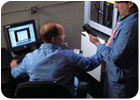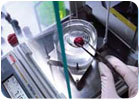
A new Adhesives and Sealants Technology Center has opened on Henkel's Madison Heights, MI, campus. The 60,000-square-foot facility provides crucial expertise and testing resources for transportation manufacturers and suppliers.
The building, the third on the Madison Heights campus, opened in July 2005 and houses 65 employees, with room for growth. It increases the size of the campus to 350,000 square feet and provides research and development support for new transportation products, including body, trim, and powertrain adhesives and sealants, as well as paint applications. The center also offers research and testing that helps their products more effectively meet customers' needs.

And customer relationships are important to the company. "The only way to know what customers need is to talk to them," said Chuck Evans, senior vice president-Automotive. He says customers visit the facility every day - the Big Three automotive manufacturers in the Detroit area as well as the multiple tiers of supplier companies. And customers take Henkel staff into their facilities as well.
In fact, one key component of the facility is the ability to work side by side with customers' engineering teams, helping to enhance component designs by using Henkel's prototyping and application testing capabilities.
Customer parts are brought in to the design and engineering area, where they are analyzed to find a solution to adhesion failure and other issues. Then the prototype area is used to fabricate and refine product design prior to production. The customer is brought into the facility as well and can witness simulation of the production environment and see what best solves the problem they are experiencing. Whether it's a die-cut part or a certain type of adhesive, Evans said Henkel provides the most effective solution to their customer. It's no longer just urethane being used as a "fix all" in the industry, he said. For example, rollover standards for sport-utility vehicles in the United States will become increasingly more stringent, with new standards going into effect in 2009. Henkel engineers are already working on changing their technology to comply with the new standards.

- Fatigue testing to determine long-term durability of parts and materials.
- Dynamic fracture drop towers to test impact resistance.
- Several quasi-static, load-testing systems.
- Extreme environment cycling equipment to test materials' reaction to significant changes in temperature and moisture.
- Thermal analysis to explore how materials react to heat exposure.
- Six-axis robotic dispensing stations that validate whether sealants and adhesives meet production requirements.
- Rheological test capability.
- Computer-aided drafting (CAD) and finite element analysis (FEA) to provide computer modelling to optimize design before prototypes are built.
- Prototype capabilities to help refine component designs before production.
- A material applications lab.


